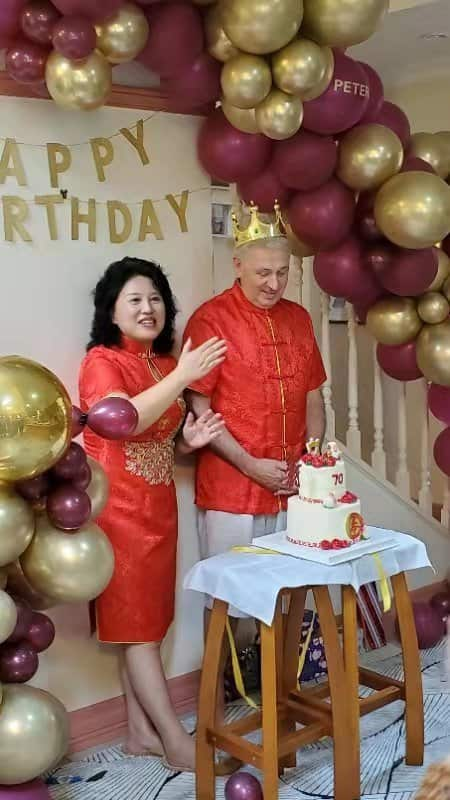Brisbane local Peter Hacker still recalls the days leading up to their departure from Wuhan and the eerie stillness in the streets.
“In the last week we barely left the apartment at all,” he told SBS News.
“There was almost no people or cars on the streets, it was like a ghost town.”
Mr Hacker had been travelling around China with his wife for his 70th birthday and said the country barely resembled itself after the coronavirus outbreak.
“It was not like how China was before,” he said.

Peter Hacker and wife Jane Bian at his 70th birthday in Wuhan. Source: Supplied
“When we did leave the house for a few big supermarkets, there were health checks before entering and we always tried to avoid crowded areas.
Mr Hacker is now living in a quarantine facility just 30 kilometres from Darwin.
He’s praised the Australian government for their prompt response when bringing resident back to home soil.
“We are very happy and pleased the Australian government provided this operation for us,” he said.
“We want to thank them from the bottom of our hearts.”
Mr Hacker is one of 530 Australians to be evacuated from the epicentre of the coronavirus outbreak.
So far there have been two flights evacuating Australians from the capital of Central China’s Hubei province, one to Christmas Island and another to the Northern Territory.

Ying Wang and her family Source: Supplied
Melbourne mother of two Ying Wang was also on the second flight with Mr Hacker and said she had been travelling with her family to celebrate Chinese New Year for the first time with her two young sons.
“We just went about our normal life when we arrived there, visiting friends and family, celebrating the festive season,” she said.
“But then one morning when I woke up, I was told by my parents that we were grounded, and we were not allowed to leave the apartment or leave Wuhan.
“It was a shock and I remember the first thing I asked my parents, do we have enough food at home?”
Back in Australia
Ms Wang said she is relieved to be back, adding the journey had taken a toll on her.
“Especially with two young children,” she explained.
“We need plenty of rest, we’ve been through a hell of a journey.”

Ying Wang and her child. Source: Supplied
266 passengers arrived in the Northern Territory at the weekend, landing on the Royal Australian Airforce Tarmac in Darwin before being transported by bus to the quarantine facility.
Here, the evacuees were segregated into smaller groups, Mr Hacker and Ms Wang part of a group of close to 25 others.
Despite having to settle into a new routine of scheduled mealtimes and medical checks, both agree that morale has remained high, at least in their group.
“Everyone I spoke to is very grateful that we have been looked after so well,” explained Ms Wang.
“People at camp are very relaxed, relieved and hopeful that will soon return to our normal lives in Australia.”
Border Control
With strict border control regulations in place, many who had hoped to travel between China and Australia have been forced to rethink their movements.

International student Maxine Li unable to come to Australia due to travel ban. Source: Supplied
Maxine Li had been hoping to return to Australia for her teaching studies at Charles Darwin University at the weekend but remains stuck in the city of Changchun due to the travel ban.
“I had to cancel my ticket back to Australia and will need to change it to sometime in March or even April,” she said.
“The rate at which the disease is spreading is pretty high so we’re pretty scared of it.
“The atmosphere is pretty intense, the government has strongly advised us to stay home because it is the most efficient way to stop the spread of the disease,” she explained.
Student Impact
Charles Darwin University said that students would be able to conduct online classes or possibly defer a semester, however, Ms Li said this might be hard with the Chinese firewall in place.
“There is an internet block, so as students we’d have to use a VPN to access foreign websites and I believe a face to face lecture is better,” she said.
Negotiations between the Australian government and Chinese authorities to remove state-imposed firewalls so students can access courses and other online material is underway.



